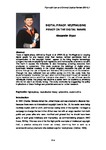Digital Piracy: Neutralising Piracy on the Digital Waves
| dc.contributor.author | Bryan, Alexander | |
| dc.date.accessioned | 2017-03-29T10:52:27Z | |
| dc.date.accessioned | 2017-04-11T11:30:16Z | |
| dc.date.available | 2017-03-29T10:52:27Z | |
| dc.date.available | 2017-04-11T11:30:16Z | |
| dc.date.issued | 2014 | |
| dc.identifier.citation |
Bryan, A. (2014) 'Digital Piracy: Neutralising Piracy on the Digital Waves', Plymouth Law and Criminal Justice Review, 6, pp. 214-235. Available at: https://pearl.plymouth.ac.uk/handle/10026.1/8999 | en_US |
| dc.identifier.issn | 2054-149X | |
| dc.identifier.uri | http://hdl.handle.net/10026.1/8999 | |
| dc.description.abstract |
Rates of digital piracy, defined by Gopal, et al. (2004: 3) as ‘the illegal act of copying digital goods for any reason other than backup, without permission from or compensation to the copyright holder’, appear to be rising despite increasingly stringent methods employed by both legislators and the industries affected to curtail it. The harm it causes the industries is also increasing; affecting everyone from producers to consumers. This study explores the aetiology of digital piracy; specifically whether students in the United Kingdom neutralise the guilt for their actions through the use of Sykes and Matza’s (1957) techniques of neutralisation. Through the data collected from an online survey (n=114) this study finds that students typically neutralise their guilt when committing piracy through an ‘appeal to higher loyalties’ and a belief that ‘everyone else does it’. The use of these specific techniques implies that piracy has become a social norm for students at university who do not see it as morally wrong. The study concludes by suggesting the policy implications of these findings and potential avenues for further research. | en_US |
| dc.language.iso | en | en_US |
| dc.publisher | University of Plymouth | |
| dc.rights | Attribution 4.0 International (CC BY 4.0) | * |
| dc.rights.uri | https://creativecommons.org/licenses/by/4.0/ | * |
| dc.subject | Digital piracy | en_US |
| dc.subject | neutralisation theory | en_US |
| dc.subject | cybercrime | en_US |
| dc.subject | student crime | en_US |
| dc.title | Digital Piracy: Neutralising Piracy on the Digital Waves | en_US |
| dc.type | Article | en_US |
| dc.type | Article | |
| plymouth.volume | 6 | |
| plymouth.journal | The Plymouth Law & Criminal Justice Review |



